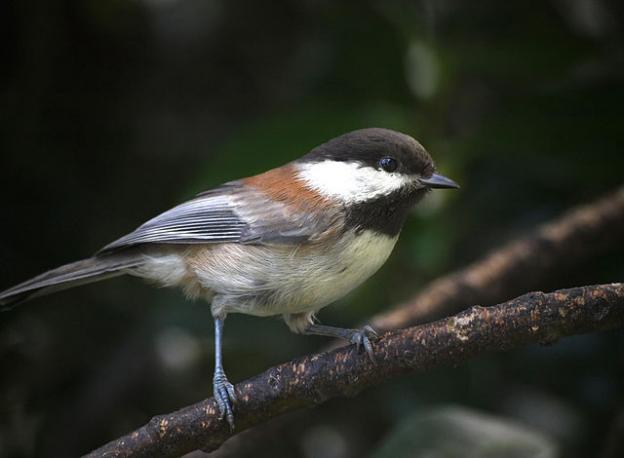by Traci Hukill
Jan. 19, 2014—As I was hanging out laundry on one of this winter's freakishly warm afternoons a few weeks ago, I heard a familiar whirr. Assuming it was the hummingbird that hangs out in the nearby oak tree and often buzzes us when we’re outside, I peered out from behind some towels to see him. No hummingbird. But I did see, perched on the edge of a planter where a few shriveled patio tomatoes still clung to yellowed stalks, a chestnut-backed chickadee.
I’m not an experienced birder by any means, but I believe I know when a bird is talking to me. It doesn’t happen often. When the neighborhood hummingbird zips ups close and hovers near us for a moment while we’re watering or eating breakfast, that feels like a hello. There are other forms of direct address. I got cussed out once by a Steller’s jay who accused me of complicity with the cat after a pounce from out of nowhere interrupted our chummy session of sunflower seed catch. The cat’s stealth and skill had taken me by surprise too, but the jay wasn’t buying it. Our friendship ended that day.
This chickadee was not making idle chitchat: it had a point to make. It cocked its head at me, gave a loud chirp, hopped down to the lip of the planter saucer and bobbed its head down toward a thin layer of drying sludge in the bottom. Coming up empty, it quickly hopped back up to the edge of the planter, gave me a pointed look and a chirp, and flew off.
The instructional pantomime worked. “Der!” thought I. "There’s no water this winter! The birds are thirsty!"
During our regular dry season, at least we’re watering the plants on the patio; maybe some of the birds rely on the planter saucers for their summer water source and I just never realized it. In winter, though, I never water the plants. Rain takes care of that.
So what are the birds doing for water during this drought, which is basically like the longest summer ever? Even if they don’t need the planter water in summertime—even if they usually get that water from someplace else—it’s entirely possible that the usual dry season water source has dried out. When I think about it, it seems incredibly obvious.
A couple of days later I found an empty planter saucer, set it beneath the partial shade of the oak, and poured in a few pans full of water. Some leftover soil and mulch floated to the top; no fresh alpine spring, but better than nothing.
I was stunned by the scene on the deck the next morning. Like a watering hole on the African savanna, the planter saucer had become the place to be. Three of the resident acorn woodpeckers, rarely seen except when the bird feeder is full, were there dipping their tri-colored heads into the water. They’re a skittish group, and as soon as they glimpsed me on the other side of the sliding glass door they were out of there. A gang of chickadees moved in. In a few minutes the juncos were there, waiting their turn. A few dainty little yellow things (Wilson’s warblers?) killed time hanging out on a planter balanced on the deck railing until things opened up.
It’s been like that every morning since. I’m not sure how these birds normally get their water in a dry season, but this watering hole is clearly welcome. And it’s thanks to the bold little chickadee, whose remedial lesson, skillfully delivered, got the message through the thick skull and self-absorption of one of the few neighbors with the power to do anything about the problem.
I’ve thought a lot about this episode. One thing it’s done is got me thinking about Plenty-coups, the Crow chief whose vision of strange men and their odd, spotted buffalos taking over his tribe’s ancestral lands led him to cooperate with the whites in the interest of securing the best possible deal for his people. It worked, to a point; as a trusted U.S. ally, Plenty-coups managed to stave off a Senate push to seize all Crow territory, and he made sure the Crow Reservation was on actual traditional Crow land, something many tribes weren’t lucky enough to get. Plenty-coups’ spirit guide, revealed to him in that same powerful vision, was the chickadee.
It always seemed strange to me that such a great leader had so small and humble a creature as his guide. A chickadee? Really? Not an eagle or a bear or a buck?
But the chickadee is clever, according to Googled Native American mythology. It points to the truth and it brings people news—in other words, it knows what’s going on, and it has the grace to share its information.
"All my life I have tried to learn as the Chickadee learns, by listening—profiting by the mistakes of others, that I might help my people,” Plenty-coups told anthropologist and biographer Frank Linderman.
I think it would not be a bad thing to be more like the chickadee: smart enough to know what's going on and brave enough to tell it to big scary people if doing so can help those who are too timid to help themselves.
Category:













